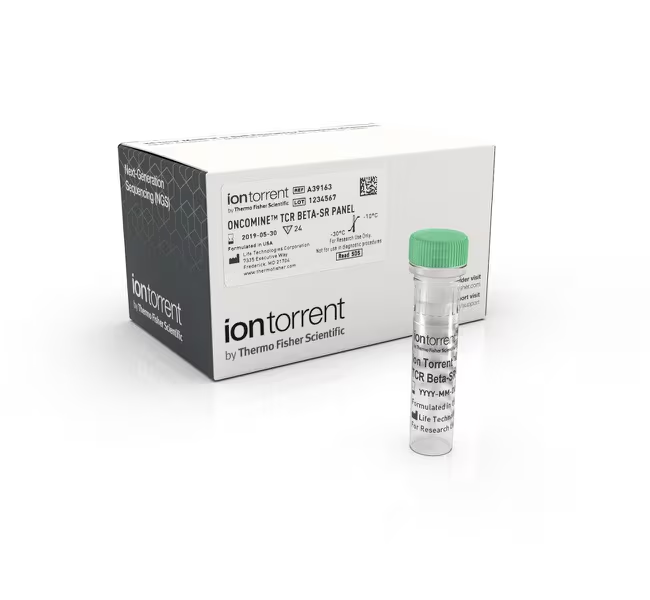
The Oncomine TCR Beta-SR Assays are robust, targeted next-generation sequencing (NGS) assays designed to accurately identify and measure the clonal expansion of T lymphocytes in formalin-fixed paraffin-embedded (FFPE) tumor samples. These assays identify unique T-cell clones through targeting of the diverse complementarity-determining region 3 (CDR3) of the T-cell receptor (TCR) gene locus in genomic DNA or RNA. The nucleotide sequence of the CDR3 region is unique to each T-cell clone and codes for the part of the TCR beta chain that is involved in antigen recognition. This particular assay is for use with DNA samples. For RNA samples, please see Cat. No. A39359.
Benefits of the Oncomine TCR Beta-SR Assay - DNA include:
• Compatibility with a vast array of research sample types, including FFPE tissue, fresh-frozen (FF) tissue, whole blood, PBLs, and PBMCs
• No need for DNA extraction from the FFPE samples with the use of Ion AmpliSeq Direct FFPE DNA Kit (Cat. No. A31136)
• High sensitivity and low limit of detection (LoD) for rare clone identification through dual-barcode indexing
• Efficient workflow with 48-hr sample-to-results time
• Flexible input requirements ranging from 100 ng to 1 μg
• Streamlined and user-friendly informatics solution with multi-sample analysis functionality
The Oncomine TCR Beta-SR Assay - DNA uses multiplex PCR primers to generate 80-bp amplicons that can be sequenced on all chip types supported by the Ion GeneStudio S5 sequencing systems, allowing you to pick the best multiplexing configuration for your unique sample batching needs and throughput requirements. The entire workflow (figure below) from isolation of DNA to analysis of samples can be accomplished in two days using the Ion Chef templating system and Ion GeneStudio S5 system. The assay kit provides a single pool of multiplex PCR primers and library reagents and is compatible with sample types such as genomic DNA from FFPE tissue, FF tissue, whole blood, PBLs, and PBMCs.
The Oncomine TCR Beta-SR Assay - DNA supports key applications in the field of immuno-oncology and hemato-oncology research. The high-sensitivity dual-barcode indexing, flexible input requirements (100 ng–1 μg), high-depth sequencing, and high-throughput capability make this assay ideal for minimal residual disease testing for T-cell malignancies in blood. The unique FFPE compatibility of this assay enables researchers to focus on T-cells and clonality in the tumor microenvironment. Measuring T-cell infiltration in the tumor microenvironment is useful in biomarker discovery and in monitoring an individual’s response to immunotherapies such as checkpoint blockade inhibitors, cancer vaccines, or chimeric antigen receptor (CAR) T-cell therapies.
Learn more about the assay ›
Note: Information about data analysis using Ion Reporter Software v5.10 can be found in the User Guide below.
| Code | Description |
|---|---|
| A39072 | Catalog Number: A39072 |

